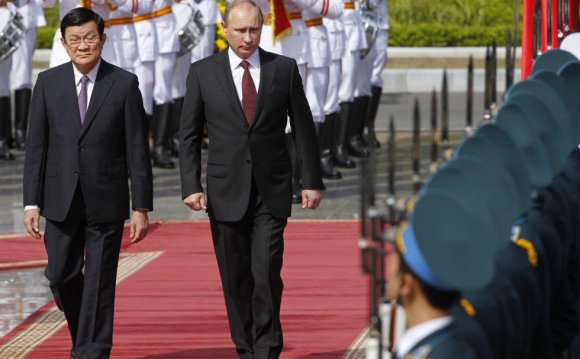
 Justified increased exposure of current Ukraine crisis cannot lead united states to help make the mistake of overlooking Russia’s guidelines in East Asia. Normally Russia’s guidelines in Southeast Asia don't get much attention. Nonetheless they expose important motifs and motifs in Russia’s total foreign plan and its particular reaction to Asia’s increasing power and to styles in Asian security. Examination of those policies shows much about Russian plan in Asia and in basic. Particularly they indicate Moscow’s search for total liberty and tactical versatility including its habitual dependence on energy and hands sales in strife-torn places because the devices where it seeks to gain influence on local security agendas. Furthermore, additionally they illustrate that like other powers, Russia is pursuing what is known as a hedging strategy against Asia in Asia. On the one-hand it supports China against the US and on others works to constrain Chinese energy in Asia.
Justified increased exposure of current Ukraine crisis cannot lead united states to help make the mistake of overlooking Russia’s guidelines in East Asia. Normally Russia’s guidelines in Southeast Asia don't get much attention. Nonetheless they expose important motifs and motifs in Russia’s total foreign plan and its particular reaction to Asia’s increasing power and to styles in Asian security. Examination of those policies shows much about Russian plan in Asia and in basic. Particularly they indicate Moscow’s search for total liberty and tactical versatility including its habitual dependence on energy and hands sales in strife-torn places because the devices where it seeks to gain influence on local security agendas. Furthermore, additionally they illustrate that like other powers, Russia is pursuing what is known as a hedging strategy against Asia in Asia. On the one-hand it supports China against the US and on others works to constrain Chinese energy in Asia.
Southeast Asia’s importance to Russia features steadily risen considering Russia’s very own pivot to Asia.[i] Within that pivot, Moscow recently proclaimed its intention to pursue negotiations for naval bases in the Seychelles and Singapore.[ii] This might be together with Russia’s formerly overt attempts to achieve basing at Cam Ranh Bay in Vietnam.[iii] And in addition, these techniques will never be welcome in Asia and are regarded as representing (and Moscow’s parallel rapprochement with Japan) Russia’s reaction to Chinese President Xi Jinping’s present invitation to become listed on China “in ensuring security and security into the Asia-Pacific area.”[iv] Quite simply, even as Russo-Chinese collaboration against US power, interests and values goes on on global problems plus regions of unimportance to Asia like Syria, Russia strives for geopolitical freedom in Asia. Had been Moscow to simply accept Xi’s provide, it would be admitting so it is actually China’s “junior cousin” in Asia; a task that Russia bridles at accepting.
Therefore Moscow is making these “chess moves” to Southeast Asia to show its true independency and great power status. While those qualities of Russia’ standing in Asia are debatable, there's no doubt that Vietnam, for example, has completely accepted Russia in an attempt to get allies to restrain China even while it continues on its own accord to pursue a diplomatic resolution of outstanding problems with China. Without a doubt, Vietnam’s partnerships with Moscow and Washington strengthen its leverage vis-à-vis Beijing, therefore allowing it to follow both armed forces and economic improvement and diplomatic resolution of disputed problems. Thus, despite the presumably deepening Sino-Russian relationship (at least resistant to the US), actually Russia has actually quietly but freely resisted Chinese encroachments in Southeast Asia and it is forging a deeper military-political commitment with Vietnam.
Beijing has repeatedly demanded that Moscow terminate energy explorations in the Southern China water, clearly responding to Russia’s visibly enhanced passions in Southeast Asia. In 2012 Russia revealed its fascination with regaining a naval base at Cam Ranh Bay, one step probably linked to joint Russo-Vietnamese power tasks off Vietnam’s coastline, and an easy method of checking Asia in South Asia water. Gazprom in addition signed a deal to explore two certified blocks in Vietnam’s continental shelf in Southern China Sea, taking a 49 percent share into the overseas obstructs, which hold an estimated 1.9 trillion cubic foot of natural gas and more than twenty-five million tons of fuel condensate. Those actions precipitated Beijing’s need that Moscow keep the area. But despite its silence, presumably in order to avoid antagonizing Asia, Moscow stayed placed. Russia has later increased help for Vietnam regarding energy exploration when you look at the Southern China Sea and, maybe much more ominously from Asia’s viewpoint, in hands product sales and security cooperation.[v]
Vietnam, clearly looking to deter Chinese threats, is becoming a major consumer for Russian tools, mainly submarines and planes. Russia and Vietnam have already been “strategic lovers” since 2001 plus they upgraded the connection to a comprehensive strategic relationship in 2012.[vi] Bilateral trade and scientific-cultural exchanges tend to be growing and Russia ranks 18th among 101 international investors in Vietnam targeting mining, handling, and production sectors (particularly power). Besides, Russia is helping Vietnam develop a nuclear power-plant.[vii]
YOU MIGHT ALSO LIKE












